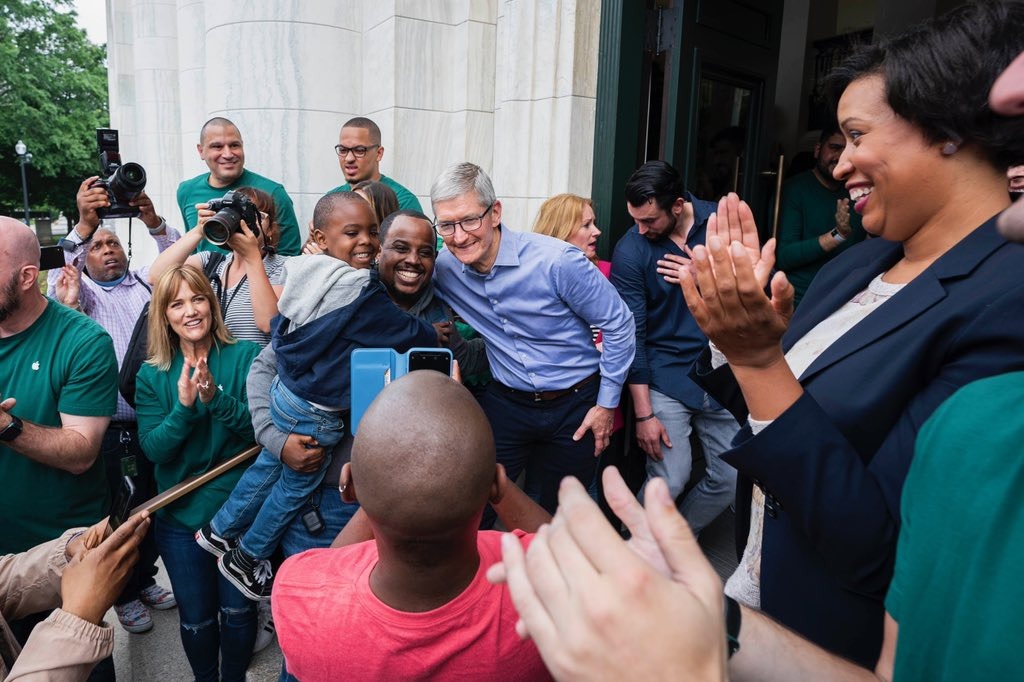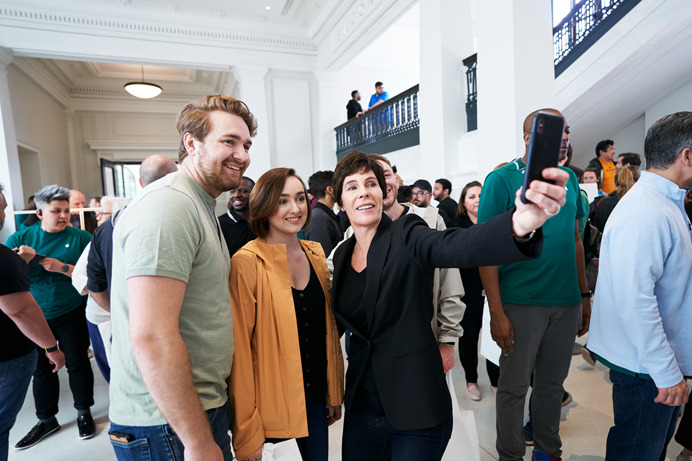Apple drew special attention to the launch of its Carnegie Library store in D.C. on Saturday, bringing not just CEO Tim Cook but retail head Deirdre O'Brien, marketing chief Phil Schiller, and the city's mayor, Muriel Bowser.
The event was publicized on Twitter by Cook and Bowser, the latter of whom shared a video of some of the first shoppers entering the store. The pair were joined by a media pool and some of the store's staff, who cheered and clapped to drum up excitement. Sizable crowds were in attendance.
Welcome to Apple Carnegie Library. #DCProud to open the store with @tim_cook and to greet residents who will now work and shop here. pic.twitter.com/kMzr4EL8i3
— Muriel Bowser (@MurielBowser) May 11, 2019
Further photos were published on Instagram by O'Brien.
Development on Apple Carnegie Library began in 2016. Apple calls it its "most extensive historic restoration project to date," requiring lengthy work on facades and details. Running with the theme of the building — and possibly trying to counter controversy over the relocation of the Library's book collection — the store will be hosting a "StoryMakers Festival" series of events between May 18 and June 29, featuring 40 artists.
 Roger Fingas
Roger Fingas








-m.jpg)






 Wesley Hilliard
Wesley Hilliard
 Marko Zivkovic
Marko Zivkovic

 Malcolm Owen
Malcolm Owen

 Amber Neely
Amber Neely











13 Comments
Somebody always comes along to throw shade on things like this so I’ll do it this time. The cultural advocates are not too happy with Apple taking over what they consider a part of D.C. heritage and turning it into an Apple temple, even though they have failed numerous times over the years to get anything funded to restore the building. Many proposed projects but no action. Apple apparently spent $30 million on the restoration efforts and now those advocates are unhappy about it.
https://www.citylab.com/design/2019/05/apple-store-washington-dc-carnegie-library-history-mt-vernon/589135/
"
I can understand both sides. In an ideal world, that library building would have been converted into a great public space. But the city blew that over many decades and it seems pretty obvious that they weren't going to put in $30 million to renovate it (and if they had, being a Government deal, it would have cost $300 million and taken ten years). On the other hand, Apple did indeed restore the building and even if one doesn't have the income to afford Apple products, one can walk into the building and use the computers. I also assume that Apple doesn't occupy the entire building so the building is still being put to other uses.
And if the City had come up with the money to restore the building, what kind of public use could the building of had? Does D.C. really need any more museums? Even if it had become a museum, most museums are quite expensive today, so I'm not sure how many of the city's residents would have made use (and even if they had, how often do people visit the same museum - once a year, maybe?) I'm a big fan of public libraries, but the library had moved out years ago. It probably doesn't have the appropriate configuration to have become a school.
On a side note, while Apple products are expensive, when I'm on the NYC subways, I see lots of people who get on or off the trains in working class and low-income neighborhoods carrying iPhones. I would assume they buy them on the monthly payment plan and they find a way to do it. With the new NYC minimum wage of $15 an hour, three hours a month can just about pay for a phone. Or maybe they're buying used or refurbished phones.
And yes, it would be nice if today's industrialists got together and left a legacy like Andrew Carnegie did. But we have to deal with today's realities and at least in the case of Bill Gates' charities, the kind of work he's doing to end diseases might be far more valuable and important than restoring an old building.